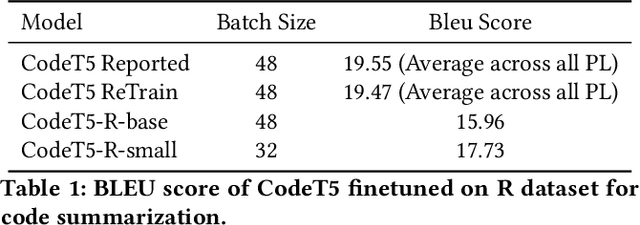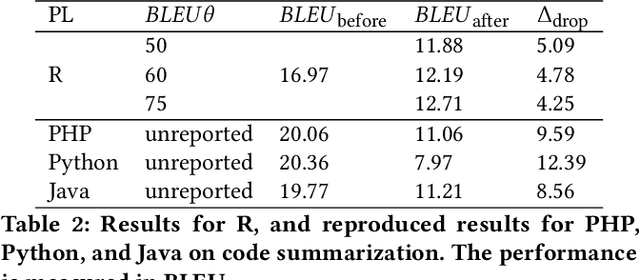Millon Madhur Das
Studying Vulnerable Code Entities in R
Feb 06, 2024



Abstract:Pre-trained Code Language Models (Code-PLMs) have shown many advancements and achieved state-of-the-art results for many software engineering tasks in the past few years. These models are mainly targeted for popular programming languages such as Java and Python, leaving out many other ones like R. Though R has a wide community of developers and users, there is little known about the applicability of Code-PLMs for R. In this preliminary study, we aim to investigate the vulnerability of Code-PLMs for code entities in R. For this purpose, we use an R dataset of code and comment pairs and then apply CodeAttack, a black-box attack model that uses the structure of code to generate adversarial code samples. We investigate how the model can attack different entities in R. This is the first step towards understanding the importance of R token types, compared to popular programming languages (e.g., Java). We limit our study to code summarization. Our results show that the most vulnerable code entity is the identifier, followed by some syntax tokens specific to R. The results can shed light on the importance of token types and help in developing models for code summarization and method name prediction for the R language.
Which one is more toxic? Findings from Jigsaw Rate Severity of Toxic Comments
Jun 27, 2022

Abstract:The proliferation of online hate speech has necessitated the creation of algorithms which can detect toxicity. Most of the past research focuses on this detection as a classification task, but assigning an absolute toxicity label is often tricky. Hence, few of the past works transform the same task into a regression. This paper shows the comparative evaluation of different transformers and traditional machine learning models on a recently released toxicity severity measurement dataset by Jigsaw. We further demonstrate the issues with the model predictions using explainability analysis.
 Add to Chrome
Add to Chrome Add to Firefox
Add to Firefox Add to Edge
Add to Edge